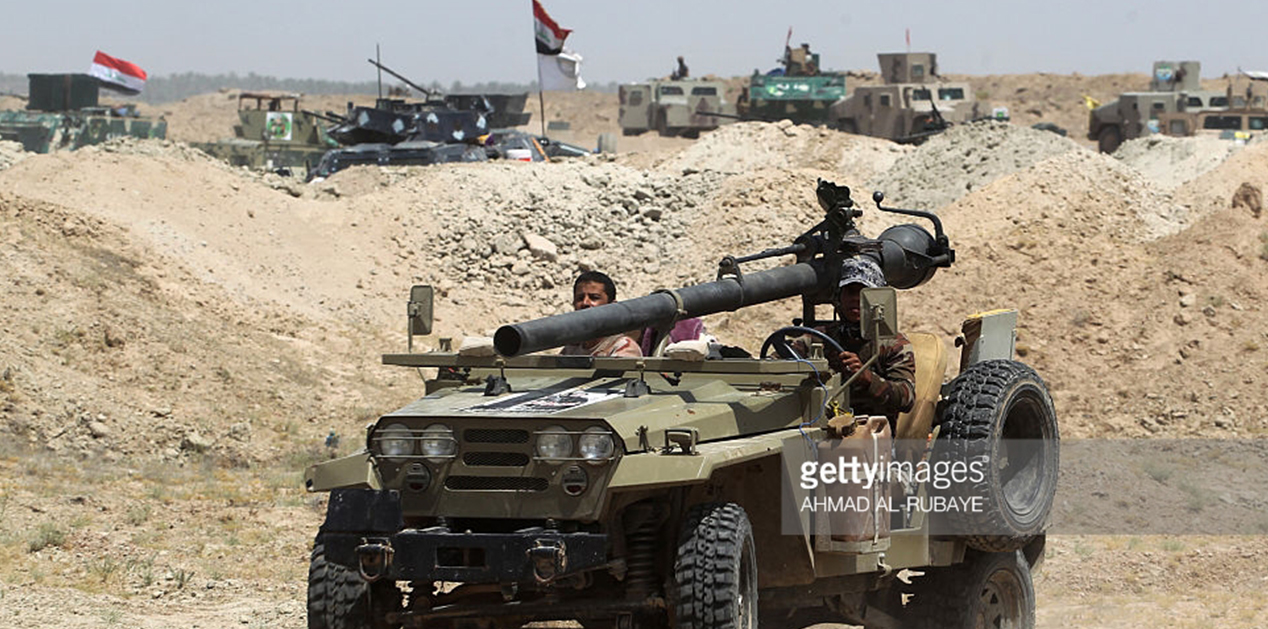In what is considered the biggest military assault against Daesh, the Iraqi army, with back up from the United States (US)-led air coalition and Iran-backed Shiite militias, recently began its operations to liberate Fallujah from this terror group. Fallujah was captured by Daesh in early January 2014. This was one of the earliest victories of this terrorist organisation which triggered its territorial expansion spree after it overpowered the Iraqi army. This also increased its reputation for “fielding diehard fighters that can defy technically superior militaries.”1 Since then, the city had been used as a base to launch operations around the surroundings of Baghdad.
However, after Iraqi Prime Minister Haider al-Abadi announced the commencement of Operation Breaking Terrorism on late 22 May, the Iraqi Security Force (ISF) and the Popular Mobilisation Units (PMU), trained and backed by Iran, began pounding Daesh militias positions the following day. The progress made by this combined force was noticeable as a couple of smaller towns, namely Garma, and Naimiyah, located at the northeast and southern part of Fallujah, respectively, were recaptured. The operation has come amidst the increasing attacks by Daesh mostly in Shia-dominated areas in and around Baghdad since the last two months killing several civilians and military personnel. After losing some of its territories continuously, the outfit has been resorting to extreme violence with a primal motive to keep the security forces engaged elsewhere and to retain territories which are still under its control. Mosul and Fallujah, incidentally are two of the important territories under their occupation.
Fallujah, which is situated 40 miles (or 64 kilometeres) to the west of Baghdad, has always remained a troubled and conflict-ridden city ever since the toppling of Saddam Hussein’s Ba’athist regime by the US-led invasion in 2003. The city since then has been a hotbed of insurgency, and a symbol of resistance not only against the US occupation of Iraq but also against the Shia-dominated Iraqi governments which were elected after Saddam’s removal. It was in this city that the US-led coalition forces conducted their “bloodiest” war in Iraq, under an operation called Operation Al Fajr or Operation Phantom Fury, between 7 November and 24 December 2004.2 This was carried out with a fundamental aim to flush out the insurgents before the January 2005 Iraqi parliamentary elections. Around 15,000 US and British troops were deployed during this operation, and approximately between 82 and 95 American troops and an estimated 2,000 (out of 3,500-4,000) insurgents were killed. 3
Although Operation Al Fajr spelt victory for the American coalition, the transitional Iraqi government that came up in May 2005 and subsequently the Nouri al-Maliki government between May 2006 and August 2015 failed to bring a viable solution to the sectarian-driven politico-security crisis in Iraq. The failure to bring back the Sunnis into the mainstream political systems resulted into the formation of deadlier terror groups, including Daesh at a later stage.
Owing to its predominant Sunni population, retention of Fallujah remains a pivotal objective for Daesh. Some of the disaffected Sunnis were believed to have even provided assistance to the outfit in taking control of both Mosul and this city in 2014. Moreover, given Fallujah’s close geographical proximity to the capital, it has become the right spot from where the militias could carry forward their violent attacks, particularly its hallmark tactic—suicide attacks. Putting these factors together, recapturing this strategic territory has become imperative for the Iraqi army but it comes with challenge.
While the operation is going to give a blow to the outfit—physically and mentally—there are problematic implications ahead. These are mainly with regard to the involvement of Iranian-backed Shiite militias, sectarian violence and humanitarian crisis. Notwithstanding the commendable efforts put up by the PMU, deployment of Shiite militias in a highly sectarian and grief-stricken locality carries the risk of triggering further resentment from the Sunnis. The reported presence of Qassem Soleimani, the head of the Iranian Revolutionary Guards Corps—Quds Force—along with two other leaders from Kata’ib Hezbollah (Hezbollah Brigades) near Fallujah,4 raised concerns regarding Iran’s involvement in Iraq.
It is not only the US which is monitoring closely the role of the “Iranian proxies” but also the latter’s arch-rival—Saudi Arabia—has considered Shiite militias’ presence as “unacceptable.”5 Iranian Foreign Minister Mohammad Javad Zarif reciprocated by criticising the “arrogance” of the Saudis. 6 In their jockeying for regional hegemony or supremacy, both countries have been supporting their surrogates in the regional conflicts (in Yemen and Syria) and building alliances. This troubling divide between the Shias and the Sunnis is getting wider and is impacting on the regional counterterrorism measures.
In Iraq, a renewed violence between the two sects, in and around Fallujah, cannot be ruled out. This was already noticed during the recapture of Tikrit in April last year where pro-government militias reportedly committed “war crimes.”7 Following this conquest, lootings and violence increased allegedly by the Shiite militiamen, and deepened Sunni’s mistrust for the central government.8 Simultaneously, many of the Iraqi Shiites are vehemently antagonistic to the Sunnis for their anti-government position and for helping Daesh’s entry into Fallujah. An emerging assumption is that “Iraqi Shi’a militias may thus engage in extrajudicial killing against civilians if they flee towards militia-held areas.”9 If this becomes a reality, sectarian violence will conflagrate, and will likely motivate a few Sunnis to side with Daesh. In other words, further radicalisation of Iraqi Sunnis may be in the offing, and neither of this is a desirable outcome at this crucial stage.
Equally worrying scenario is the humanitarian crisis arising out of the operation. Although Iraq’s defence ministry warned Fallujah’s residents to stay away from Daesh’s positions or leave their homes, nearly 50,000 (including 20, 000 children as per the United Nations report)10 remained trapped. Out of this, 5,000 people have reportedly fled since the beginning of the operation. It is a matter of grave concern that many of these children will likely be recruited into Daesh and forced into fighting. Prior to the operation, the conditions of the civilians began to deteriorate since February this year when the Iraqi security forces prevented food and medical supplies from reaching the city.11 Further, news of civilians being used as human shields in the Anbar Province by Daesh militias already emerged in early May, and they are now preventing these people from fleeing. This is a tactic employed in several parts of Iraq under this outfit’s control. Efforts for evacuation and protection of civilians will not be easy as the extremists laid several mines on the outskirts of the city. This is the main reason why the operation has been stalled.
Considering the mass movement of people out of Fallujah, the problem of displacement of civilians is imminent, and therefore, it is not only going to be solely security ordeal but also a social and political one. It is possible that these displaced citizens will move towards Kurdish and Shia-dominated areas, including Baghdad. Their safety, therefore, needs to be guaranteed. In such a scenario, the Iraqi authorities need to have proper rehabilitation plans and prevent sectarian clash. As cautioned by an analyst, “Examining the social and political dimensions of the anti-ISIS offensive reveals that ‘victory is likely to be short term as long as the drivers that led to the emergence of ISIS in Iraq in the first place continue to be reproduced.”12 This is an apt observation as mere physical destruction or ousting Daesh from its territories will not end the menace. Looking at the deteriorating political and security order, Baghdad is far from meeting these challenges. A missing factor for a successful anti-Daesh operation is the unity between the two sects in the country. Going by the record, no external involvement or intervention in resolving crisis in West Asia, so far, brought a desirable result. This operation is apparently heading in that direction although a short-term solution may be on the horizon. In the absence of a long-term strategy to resolve the social and political grievances, particularly of the Sunnis, expecting a stable Iraq will be hope against hope.
Endnotes
- Martin Chulov, “Fight or Flight: surprise attack on Falluja poses dilemma for Islamic State”. The Guardian, 31 May 2016.
- Dan Lamothe, “Remembering the Iraq War’s bloodiest battle, 10 years later”, The Washington Post, 4 November 2014.
- Ibid. Also see “Jared Malsin, “How a Victory Over ISIS in Fallujah Could Actually Hurt Iraq”, Time, 31 May 2016.
- Caleb Weiss, “Iranian Qods Force leader reportedly in Fallujah”, Long War Journal, 23 May 2016.
- “Saudi: Iran armed units must leave Iraq”, Al Arabiya, 29 May 2016.
- “Iran tells Saudi Arabia: We'll leave Iraq when Iraq asks”, The Daily Star (Lebanon), 1 June 2016.
- James Gordon Meek, et al, “Dirty Brigades” US-Trained Iraqi Forces Investigated for War Crimes”, ABCNews, 11 March 2015.
- For a relevant report, see “After Iraqi forces take Tikrit, a wave of looting and lynching”, Reuters, 3 April 2015.
- Patrick Martin, “Fallujah Control of Terrain Map”, Understanding War, 27 May 2016.
- Peter Hawkins, “Iraq: UNICEF calls for protection of the children of Fallujah”, Statement, UNICEF, 1 June 2016.
- Loveday Morris, “Trapped by the Islamic State, Iraqis in Fallujah say they are going hungry, too”, The Washington Post, 1 February 2016.
- Lina Khatib, “Suffering May Not Be Over for Iraqis Liberated from ISIS”, Chatham House, 31 May 2016.
Published Date: 6th June 2016, Image Source: http://www.gettyimages.in
(Disclaimer: The views and opinions expressed in this article are those of the author and do not necessarily reflect the official policy or position of the Vivekananda International Foundation)










Post new comment